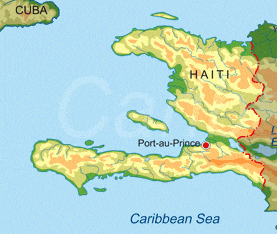In the night of July 7, 2021 several assailants entered the home of Haitian President Jovenel Moise and assassinated him, apparently without meeting resistance by his guards. Within days of the shooting, several suspects were killed and others arrested, while some allegedly managed to flee the country. Assailants were reportedly Colombian nationals. So far, no evidence has been presented on who actually might have ordered the assassination.
The Haitian government requested unspecified assistance from the United States and the United Nations. The Biden administration has reportedly offered law enforcement personnel and resources to investigate the assassination, but not a military or other stabilization mission. The Haitian government requested a UN commission of inquiry and potential special tribunal to investigate the assassination and prosecute those reponsible. Investigations are currently still pending.
Claims to Power
President Moise was elected in 2015 and was elected again in the re-run election in 2016 after the first election had been annulled. He had been facing a legitimacy crisis since opinions were divided on whether his term should end five years after either the first or the second election he had won. Since its independence, Haiti has been plagued by exploitative foreign influence, natural disasters, economic and social instability, and well-intentioned but often harmful international assistance. In recent years, intensifying social and economic struggles, rising crime rates, and a progressively autocratic rule have caused the beginnings of political stability to deteriorate in Haiti. President Moise had postponed the parliamentary elections scheduled for 2019, which led to the term of two thirds of Haiti’s senators expiring. Consequently, without a quorum, the Senate has become defunct. President Moise also suspended the Chamber of Deputies in January 2020.
As the Haitian Constitution foresees, Haiti’s interim prime minister Claude Joseph took over executive affairs and ordered martial law and other restrictions to be imposed. President Moise had appointed Ariel Henry as the new Prime Minister on July 5, but Henry was not been sworn in before the assassination. Both, Joseph and Henry, have then claimed the job of Prime Minister until a new President is chosen, which should be done by the defunct Parliament according to the Constitution. Additionally, a majority of the remaining members of the Haitian Senate unconstitutionally declared the Senate’s president Joseph Lambert the new President. On July 19 the conflict was resolved at least preliminarily by Joseph resigning as prime minister and agreeing to serve as Foreign Minister under Ariel Henry, who was sworn in the next day. Elections have been scheduled for the fall of 2021.
Constitutional Shortcomings
Although any step towards a new elected government is to be welcomed, the constitutional crisis persists and has uncovered significant weaknesses in the Haitian Constitution. Since there is no non-election-based system of succession comparable to the United States, the choice for a new president is to be made by Parliament. Consequently, presidential succession in accordance with the constitution depends on a functioning parliament. The main problem is that, unfortunately, President Moise was able to render Parliament defunct by postponing elections until the terms of office of a sufficient number of members of parliament (MPs) had ended. This is not uncommon and likely unproblematic, if a democratic system is stable enough to always be able to rely on timely, fair and lawful elections. If not, however, the lack of presidential succession independent of parliament also threatens the stability of the executive branch. Together with the Haitian Senate’s function as High Court of Justice, a defunct Parliament might throw all three branches of government into this constitutional crisis.
International Assistance?
Given the complicated and poor history of foreign and UN interventions in Haiti and the very disasters caused by UN troops, a military or other large stabilization mission is unlikely. The United States has already declined a request for a broader (military) mission based on the consent of the Haitian government. With regard to the United Nations, a resolution by the Security Council would likely be needed to authorize a mission. Currently, there is no sign of anything beyond political and possibly financial support.
The history of interventions in Haiti also raises the question of how the international community could help at all. What would be different in a new long-term stabilization mission? Unfortunately, there currently are no answers or new ideas on how the international community could successfully intervene in this situation. Civil society organizations in Haiti are trying to work for societal and governmental reforms. There is no way to know the outcome of such a process or who or what really represents the will of a majority of the people of Haiti. Without a new comprehensive strategy and a clearer political landscape in Haiti, foreign intervention won’t improve the situation. One can only hope that with light political and financial support, Haitians will be able to return to democracy and stability by themselves.
Author Biography: Michael Friedl is the Senior International Security Reporter at the International Law and Policy Brief (ILPB) at The George Washington University Law School. He obtained his first law degree from the University of Vienna (Austria) and currently pursues an LL.M degree in National Security and U.S. Foreign Relations Law as a Fulbright scholar at The George Washington University Law School.

